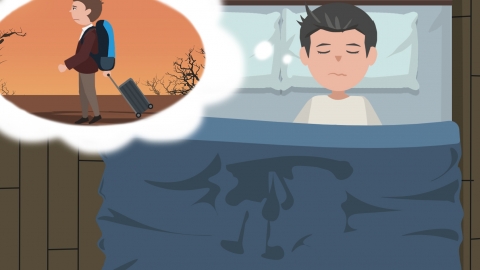Why do the arms twitch during dreaming?
Generally, arm tremors during dreaming may be caused by dream stimulation, sleep cycle transitions, calcium deficiency, essential tremor, epilepsy, and other factors. It is recommended to seek timely medical consultation to identify the underlying cause and receive symptomatic treatment under a doctor's guidance. Detailed analysis is as follows:

1. Dream stimulation: During dreaming, the brain simulates specific scenarios, and the related nerve excitement is transmitted to the arm muscles, causing tremors. This usually occurs occasionally and does not cause discomfort after waking up. No special treatment is required; maintaining regular sleep patterns, avoiding tense or stimulating content before bedtime, and reducing vivid dreams can naturally decrease the tremors.
2. Sleep cycle transition: After falling asleep, transitioning from deep sleep to light sleep weakens the brain's control over muscles, occasionally causing arm muscle twitching accompanied by brief confusion. This is a normal physiological phenomenon. Adjusting the sleep environment, maintaining quiet and comfort, avoiding excessive fatigue before bedtime, and stabilizing the sleep cycle can alleviate the tremor symptoms.
3. Calcium deficiency: Insufficient calcium in the body increases neuromuscular excitability, making arm tremors more likely during sleep, often accompanied by leg cramps and fatigue, commonly seen in adolescents and pregnant women. Patients can take calcium supplements such as calcium carbonate D3 tablets, calcium gluconate tablets, or calcium lactate granules as directed by a physician. Additionally, increasing sun exposure to enhance calcium absorption and incorporating calcium-rich foods like milk and soy products into the diet is recommended.
4. Essential tremor: The exact cause is unknown but may be related to heredity. During sleep, fluctuations in nerve excitability cause involuntary arm tremors that worsen with emotional tension and may also manifest as mild tremors while awake. Avoid emotional excitement before bedtime, reduce intake of stimulants like coffee and strong tea, and use medications such as propranolol tablets, atenolol tablets, or primidone tablets as directed by a physician to relieve symptoms when tremors are evident.
5. Epilepsy: Abnormal discharges of brain neurons, with reduced inhibitory effects during sleep, lead to arm tremors typically characterized by rhythmic and repetitive movements, possibly accompanied by foaming at the mouth and loss of consciousness. Patients should maintain regular sleep patterns, avoid staying up late, follow medical advice to take medications such as carbamazepine tablets, sodium valproate sustained-release tablets, or phenytoin sodium tablets to control seizures. If drug treatment proves ineffective, surgical removal of the epileptic focus may be considered to eliminate abnormal brain tissue discharges and reduce seizure frequency.
In daily life, maintaining good sleep habits, avoiding staying up late and excessive fatigue, relaxing the body and mind through foot baths or listening to soft music before bedtime is recommended. Choose loose-fitting clothing during sleep to avoid arm compression and reduce tremors caused by muscle tension. Engaging in appropriate physical exercise to enhance physical fitness and nervous system stability helps reduce abnormal tremors.





